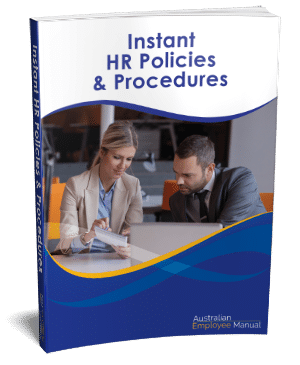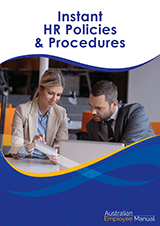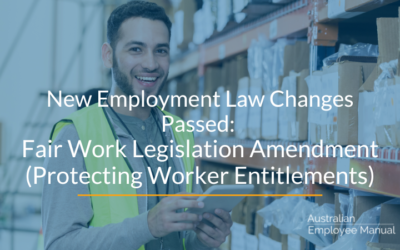As an employer in Australia, you are legally obligated to comply with the minimum employment standards that apply to your industry and employees. These standards are set by the Fair Work Act 2009 (Cth) and the National Employment Standards (NES), as well as any relevant modern awards or enterprise agreements.
However, the Fair Work Act is not the only legislation that affects the employment relationship in Australia. Other federal, state and territory laws deal with various aspects of employment, such as superannuation, taxation, occupational health and safety, workers’ compensation, anti-discrimination, equal opportunity, privacy, and immigration.
In this post, we will look at the Fair Work Act, National Employment Standards, Modern Awards and Enterprise Agreements.
The Fair Work Act
The Fair Work Act is the main piece of legislation that regulates the employment relationship in Australia. It sets out the rights and obligations of employers and employees in the national workplace relations system and establishes the roles and functions of the Fair Work Ombudsman and the Fair Work Commission.
The Fair Work Act covers areas such as the National Employment Standards, modern awards, enterprise agreements, minimum wages, unfair dismissal, general protections, industrial action, bargaining, transfer of business and compliance and enforcement.
What are the National Employment Standards (NES), and how do they apply to your employees?
The NES are 11 minimum entitlements that must be provided to all employees in Australia. These entitlements are mandatory for all businesses that employ people, regardless of size or industry and whether or not the employee is covered by an award, registered agreement or employment contract.
The NES are designed to ensure that all employees have a fair and consistent minimum standard of employment and that employers comply with their legal obligations.
The NES covers the following areas:
- Maximum weekly hours of work
- Requests for flexible working arrangements
- Offers and requests to convert from casual to permanent employment
- Parental leave and related entitlements
- Annual leave
- Personal/carer’s leave, compassionate leave and family and domestic violence leave
- Community service leave
- Long service leave
- Public holidays
- Notice of termination and redundancy pay
- Fair Work Information Statement and the Casual Employment Information Statement
The NES apply to all employees, but some entitlements may vary depending on the type of employment, such as full-time, part-time, casual, fixed term or seasonal.
What are modern awards and enterprise agreements, and how do they affect your minimum obligations as an employer?
Modern awards and enterprise agreements are legally binding documents that set out minimum wages, conditions of employment, and other entitlements for employees in specific industries and occupations in Australia.
Modern awards are industry or occupation-based documents that cover most employees in Australia. They are made by the Fair Work Commission, and they provide entitlements such as pay, hours of work, rosters, breaks, allowances, penalty rates and overtime.
Enterprise agreements are collective agreements made between an employer and a group of employees, usually with the help of a union or other bargaining representative. They are negotiated and approved by the Fair Work Commission, and they can cover a single business or multiple businesses
Enterprise agreements can contain provisions that are different or better than those in the relevant award that covers that workplace, provided that the agreement passes the “Better Off Overall” or BOOT test.
Awards and enterprise agreements operate on top of the provisions contained in the National Employment Standards. No award or agreement can remove the rights in the National Employment Standards.
Small business owners need to understand several key aspects of modern awards, including:
Which modern award applies to their employees: Small business owners need to determine which modern award applies to their employees based on their industry and occupation.
To do this, you can use the Fair Work Ombudsman’s Find My Award Tool to check which modern award covers your industry or occupation or search the Fair Work Commission’s website for registered enterprise agreements.
Minimum pay rates and conditions: Modern awards set out minimum pay rates and conditions of employment, such as hours of work, overtime rates, penalty rates, and leave entitlements. Small business owners must comply with the minimum pay rates and conditions outlined in the relevant modern award.
Employment classifications: Modern awards set out employment classifications based on skill level and experience, such as junior, apprentice, or senior employees. Small business owners need to ensure that they are paying their employees the correct rate of pay based on their classification.
Flexibility arrangements: Modern awards provide flexibility arrangements, such as flexible working arrangements or part-time work. Small business owners should be aware of these arrangements and consider implementing them where appropriate to meet the needs of their employees.
Compliance requirements: Small business owners must understand their compliance obligations under the modern award, including record-keeping requirements and annual wage increases. They should also be aware of the penalties for non-compliance, which can include fines and legal action.
What Superannuation Do I Need to Pay My Employees?
Under the superannuation guarantee, employers must make regular superannuation contributions to their eligible employees’ chosen superannuation fund.
This contribution is currently set at a minimum of 10.5% of an employee’s ordinary time earnings. However, this will progressively increase to 12% by 2025.
The ATO has detailed information about the Superannuation Guarantee and how to calculate your payments.
How can you check and update your employees’ pay rates, classifications, and entitlements?
As an employer, you must pay your employees correctly and fairly, according to the relevant laws and agreements that apply to your business and industry. You also need to keep up to date with any changes or updates that may affect your employees’ pay rates, classifications and entitlements, such as minimum wage increases, award variations, enterprise agreement negotiations or tax changes.
There are several ways that you can check and update your pay rates, classifications and entitlements for your employees, depending on the source and type of information you need.
- Fair Work Ombudsman’s Pay Calculator – an online tool that calculates base pay rates, allowances and penalty rates (including overtime) for employees covered by a modern award or the national minimum wage. You can use the Pay Calculator to find your award, check your pay rates and entitlements, and compare different scenarios or options. You can also access the Pay Guides, which are documents that provide the current minimum pay rates and the most frequently used allowances and penalty rates for each classification in a modern award12.
- Australian Taxation Office’s (ATO) Tax Calculator and the Super Guarantee Contributions Calculator – are online tools that calculate the amount of income tax and superannuation you must withhold from your employees’ pay.
- Australian Bureau of Statistics (ABS) Average Weekly Earnings (AWE) data – a weekly publication that provides estimates of average weekly earnings for full-time and part-time employees in Australia by sector, industry, occupation and gender. You can use the AWE data to benchmark your pay rates against the national or industry averages.
- Consult your relevant industry association or employer organisation, which may provide you with specific and tailored information and advice on pay rates, classifications and entitlements for your employees based on your industry, sector or occupation.
Best practices and tips for ensuring that you comply with the minimum employment standards and avoid disputes and penalties
To ensure that you are compliant with the Fair Work Act and other employment legislation in Australia, you need to:
- Understand your rights and obligations as an employer under the Fair Work Act and other employment laws.
- Keep up to date with changes to employment legislation: Employment legislation is subject to change, so it is crucial to keep up to date with any changes that may affect your business.
- Develop policies and procedures that align with the requirements of the Fair Work Act and other employment legislation in Australia. (Our suite of HR Policies and Procedures makes this task much simpler and easier).
- Review your employment contracts, policies and procedures regularly to ensure they comply with the Fair Work Act and other employment laws and reflect your business’s and your employees’ current needs and expectations.
- Ensure you pay your employees correctly and on time. Use the Fair Work Ombudsman’s Pay Calculator and Pay Guides to check and update your employees’ pay rates, allowances, and penalty rates. You can also use the Australian Taxation Office’s Pay Calculator and website to check and update your tax and superannuation obligations for your employees.
- Keep accurate and complete records of your employee details, hours worked, pay rates, leave entitlements, superannuation contributions and tax withholdings, and provide your employees with pay slips.
- Communicate with your employees regularly and openly about their employment conditions, rights and obligations. Ensure that your managers and employees are aware of their obligations and rights under the Fair Work Act and other employment legislation. Provide training to ensure that they understand and comply with your policies and procedures.
- Respond to any requests for flexible working arrangements from your employees in a timely and reasonable manner that complies with the timelines set out in the legislation. Consider the benefits and challenges of such flexible working arrangements for your business and employees.
- Plan and consult with your employees and their representatives if you need to make any changes to your business that may affect their employment, such as restructuring, downsizing, outsourcing or relocating.
- Seek advice and assistance from the Fair Work Ombudsman, your relevant industry association, union or employer organisation, or a qualified HR Consultant or workplace relations lawyer if you have any questions or concerns about your compliance with the Fair Work Act or other employment laws, or if you need to resolve any workplace issues or disputes.
By ensuring you comply with the Fair Work Act and other employment legislation in Australia, you can protect your rights and interests and foster a fair and harmonious work environment. You can also avoid or minimise the risk of legal action, penalties or reputational damage arising from non-compliance.




